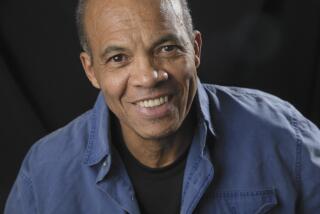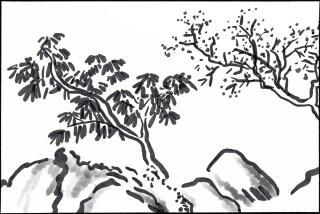The Man at the Dinner Table : FATHERALONG: A Meditation on Fathers and Sons, Race and Society, <i> By John Edgar Wideman (Pantheon: $21; 197 pp.)</i>
- Share via
In the mind of today’s American child, the father is a mysterious figure. One of two children will grow up in a home where the father is absent for six years. Of those fathers who remain living in the same home with their children, many are working two jobs. Employed or unemployed, they are gone. Anonymous. Lost. Dead.
Seeking one’s father has become one of the tragic personal dramas of the age in which we live. Among African Americans, the situation is even more dire: 85% will grow up in a home headed by a single mother. Add to that all of the intact black homes in which fathers labor at two jobs, and it is not hard to understand why presences and absences are fundamental themes in African American family life.
And yet, for all the sociological studies of black kinship, the absence of personal exchanges between fathers and sons has never been so insightfully described as in “Fatherlong,” John Edgar Wideman’s book of personal stories about his own distant relationship and “long delayed conversations” with his father.
Wideman is one of America’s greatest novelists, well known for his portraits of black urban life. In the book’s title story, he meditates on his Pittsburgh youth, when his father worked daily in the restaurant of Kaufman’s department store (“in a short white jacket and black pants”), and nightly at a second job. “I did not expect him to do much more than come and go like a ghost, at odd hours, to sleep, to eat,” he writes. “He was my father and worked long and hard for us. We slept in the same house, but at different hours.”
When Wideman’s father was not working or living at home, he was likely in another part of town--beyond Hamilton Avenue, a mysterious and disreputable district of bars and poolrooms. His account of crossing these streets and searching for his father raises the painful dilemma faced by multitudes of young black men who seek their mysterious fathers today: The women in one’s house have organized their lives to raise a boy alone and protect him from the dangers that ruin black men. So is the father search then an act of deserting or shaming the women? Whatever it is, Wideman writes, the search “is finally only a trope, a ropa-dope trope containing enough rope to hang you up terminally, you black bastard.”
“Fatherlong” is a masterpiece of sociological speculation, constructed with such an abundance of wisdom as to compensate for its lack of evidence regarding questions on which there are no easy answers. Viewing the search for fathers as a crucial experience of black manhood in America, he sees the absence of the black father as the key to comprehending the high levels of violence that stand behind the collapsing moral order of America’s inner cities. “People are easier to kill if they come from nowhere. If they have no names, no fathers or mothers,” he writes. “The dead . . . are nobodies who began nowhere, go nowhere except back where they belong.” Coming from nowhere, going nowhere is the defining characteristic of black manhood in America.
Wideman looks closely at the garments that appeal to young men today. “Oversize and drooping . . . off the behind styles . . . styles antithetical to the city; Timberland boots, Pendleton wool shirts. Isn’t one message of these costumes loud and clear: ‘We’re still kids . . . . Help us pull ourselves together. Hike up these baggy drawers. Turn my cap around.’ But if abandonment, a plea for help are projected in styles of dress, there are also the cold distant eyes, daring you to touch.” Has American society created an unbridgable distance between black fathers and sons?
Though he begins his book by asking if we can stop seeing the world through the prism of race, by the end of “Fatherlong” Wideman suggests that we are unable to do so. The distance between black sons and their fathers is rooted in their own racial exclusion from the larger society. Marginalized in a labor market that demands increasing skills for mediocre opportunities, black fathers are unable to attain the minimum self respect necessary to establish their own manhood. Fathers who secretly question their own masculinity stay away from their sons.
“One of the worst aspects of this distance,” argues Wideman, “is the unwitting complicity of the victims perpetuating it. Because we don’t talk or can’t talk father to son, son to father, each generation approaches the task of becoming men as if no work has been accomplished before.”
More to Read
Sign up for our Book Club newsletter
Get the latest news, events and more from the Los Angeles Times Book Club, and help us get L.A. reading and talking.
You may occasionally receive promotional content from the Los Angeles Times.






